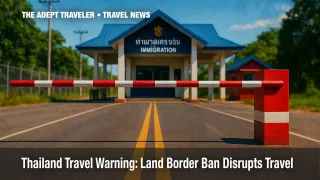Thailand Travel Warning: Land Border Ban Disrupts Tourist Routes

Thailand has issued a sweeping travel warning that halts nearly all tourist crossings at its land borders with Cambodia. The abrupt measure, announced on June 24 2025, forces visitors to rethink overland itineraries and visa-run plans within Southeast Asia. Only travelers with essential needs-such as students, medical patients, or buyers of critical goods-may still transit at selected checkpoints.
Key Points
- New land-border ban affects all five Thai provinces adjoining Cambodia.
- Why it matters: thousands of backpackers rely on these crossings for low-cost regional travel.
- Air links remain open, but overland visa runs are suspended.
- Thailand cites casino traffic and online scam hubs in Cambodia as key concerns.
- Cambodia retaliates with import curbs and media blackouts.
Thailand Travel Warning Snapshot - How It Works
Checkpoints in Sa Kaeo, Buriram, Surin, Ubon Ratchathani, and Trat are now closed to foreign leisure travelers. Border police will permit crossings only for documented humanitarian or educational reasons. Air passengers may still fly into Cambodian gateways such as Siem Reap or Phnom Penh, but onward road travel from Thai soil is off-limits.
Thailand-Cambodia Border Ban - Background Brief
The closure stems from a simmering territorial dispute sparked by a May 28 skirmish that killed a Cambodian soldier near the Emerald Triangle. Tensions flared again after a leaked phone call between Thailand's Prime Minister Paetongtarn Shinawatra and Cambodian Senate President Hun Sen, prompting nationalist backlash in Bangkok and a coalition walk-out. In recent days, Phnom Penh halted Thai fuel imports and blocked Thai media, while Bangkok tightened visa rules and threatened to cut electricity to areas hosting alleged cyber-scam syndicates.
Thailand Travel Warning Latest Developments
Thailand's border crackdown is evolving quickly. Travelers should monitor official advisories and adjust plans before arriving in Bangkok or the eastern beach hubs.
Checkpoint Status and Exceptions
Army units now staff every crossing with Cambodia, turning away tourists, ride-share vans, and even motorcycles. Students enrolled in Cambodian schools, critical-care patients, and cross-border traders carrying staple foods may apply for passage.
Airline and Visa-Run Impact
Budget carriers flying from Bangkok to Siem Reap and Phnom Penh still operate, but demand is surging as overlanders pivot to the air. Popular 30-day "visa-run" loops-where long-stay visitors exit Thailand briefly to reset tourist visas-are on hold until further notice. Thai immigration has not offered grace periods; over-staying fines remain 500 baht (≈ 14 USD) per day.
Regional Repercussions
Cambodia's boycott of Thai internet and agricultural imports may raise produce prices in Phnom Penh markets within weeks. Thai tour operators fear cancellations for combined Angkor-Bangkok packages, while travel insurers report a spike in policy upgrades that cover "political unrest." Neighboring Laos, which shares checkpoints in the dispute zone, is bracing for rerouted tourist traffic along the Mekong corridor.
Analysis
For U.S. travelers, the Thailand travel warning underscores the need to stay flexible. Anyone banking on an easy bus hop from Bangkok to Angkor Wat should instead book a low-cost flight or add a detour through Ho Chi Minh City. Overlanders already near the border should return to Bangkok by domestic coach and connect southward or fly onward. Travel advisors should verify clients' visa-expiration dates and steer them toward consulates in Bangkok for extensions.
Currency swings could make Cambodia's riel volatile; carrying small-denomination U.S. bills-an age-old safety tactic-remains prudent. Finally, insurance that covers evacuation in case of unrest is now more than a box-ticking exercise; it is a must-have line item alongside sunscreen and mosquito repellent. For deeper planning tips, see our Guide to Thai Visas and check the Cambodian Ministry of Foreign Affairs for entry updates.
Final Thoughts
The Thailand travel warning on land crossings with Cambodia may last weeks or even months. Build extra transit time into Southeast Asia itineraries, keep digital and printed copies of onward tickets, and subscribe to embassy alerts. Above all, remain adaptable; in dynamic border regions, the only certainty is change. With careful planning, you can still enjoy Thailand's beaches and Cambodia's temples-just not on the same road trip, for now. The Thailand travel warning demands vigilance today, but resilient travelers will find new routes tomorrow.
